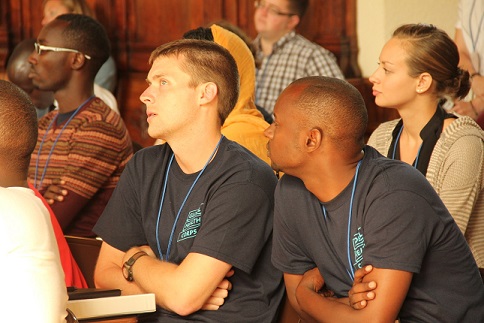Over the past five years, we’ve learned that to effectively serve others and make an impact, global health leaders must engage in self-reflection and self-care. We are keeping those lessons in mind as we head into our annual Closing Retreat tomorrow with our outgoing class of 2013-2014 fellows who have just finished up their year of service at their GHC placements. At both the Closing Retreat for outgoing fellows, and the Training Institute for incoming fellows last month, our programming and trainings explore the themes of resiliency and vulnerability as they relate to leadership. Through speakers, small group sessions, and journaling exercises, fellows work on better understanding themselves, their stories and histories, their biases and assumptions and fears, with the goal of becoming more thoughtful and impactful global health leaders during their fellowship year and beyond.
Since our founding we have had the privilege of working with Still Harbor, an organization that accompanies individuals and organizations engaged in social justice efforts. Still Harbor facilitated sessions almost every day this year at Training and joins as at our Closing Retreat in Rwanda. Fellows will work with Still Harbor throughout their fellowship year for personal, spiritual, and professional guidance. Still Harbor teaches us the importance of understanding ourselves before embarking on social change work. As they put it:
If you’re going to work for others and for the world, you’re going to have to work on you first.
Which means: vulnerability—embracing it, exploring it, and sharing it. At Training, our fellows watched Brené Brown’s TED talk, the Power of Vulnerability:
[We must] believe that we’re enough. Because when we work from a place that says, “I’m enough,” then we stop screaming and start listening, we’re kinder and gentler to the people around us, and we’re kinder and gentler to ourselves.
We also heard from Dr. Sharon Rudy, a cross-cultural communications expert, led team building activities to confront our own cultural biases and reminded us that in order to lead effectively, particularly in an increasingly globalized world, we have to take time to understand other peoples’ perspectives and viewpoints. As she taught us:
The most important thing in leadership is to awaken the inner observer.
Lastly, Robert Kaplan, a professor of leadership at Harvard Business School encouraged us to reflect on our “failure narratives”; in other words, the stories we tell ourselves about our own failures that impact our behavior and interactions with people around us. Rather than discouraging us from failing, which is critical for personal and professional growth, Kaplan emphasized the need to practice humility, especially when entering a new environment. He reminded us that:
It is not a sign of weakness to say “I don’t know”.
What we’ve been reading:
- Discovering Your Authentic Leadership, Bill George, Peter Sims, Andrew N. McLean, and Diana Mayer
- What You’re Really Meant to Do, Robert Steven Kaplan
- In Praise of Followers, Robert E. Kelley
What we’ve been watching:
- The Power of Vulnerability, Brené Brown

